Whenever we are having our cup of coffee, one of the most common things that we hear is that we are adding caffeine to our diet. Caffeine and coffee are interrelated and have a perfect amount of caffeine in coffee are beneficial for your health.
Excess of anything is always is dangerous so is with caffeine, have average caffeine in coffee and enjoy its benefits.
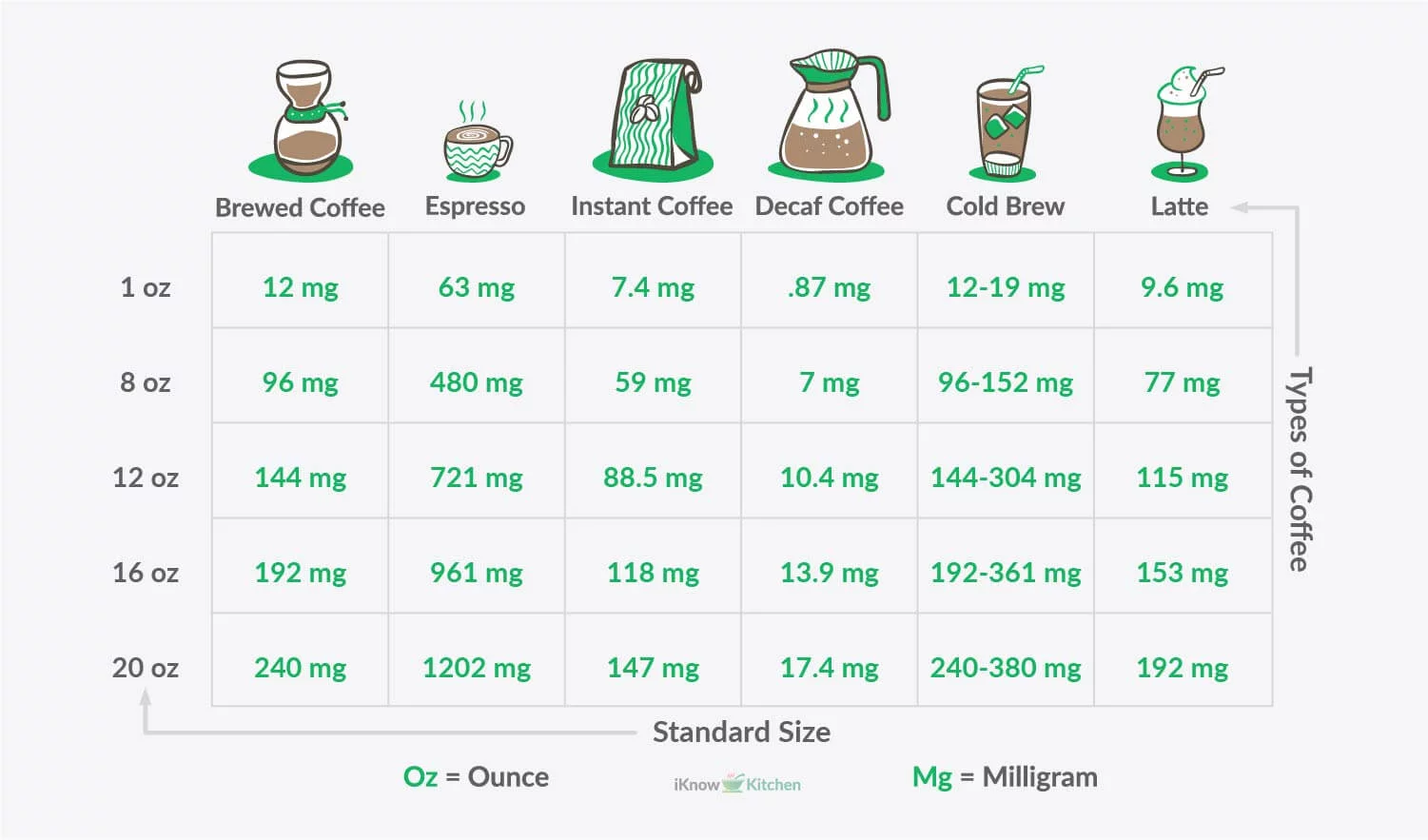
What is Caffeine?
Caffeine is a white powdery substance that is obtained from over 60 different types of plants all around the world and is bitter.
Caffeine is used as a psychoactive drug and caffeine content in coffee is up to 0.01% of normal coffee’s composition. Here are some of the scientific details of coffee.

- Names: Trimethylxanthine
- Density: 1.05 gm/cm3
- Formula: C8H10N4O2
- Molecular weight: 194.19 g/mol
- Melting point: 237 degree Celsius
- Boiling point: 178 degree Celsius
How Does it Work?
Caffeine is generally known for mood-enhancing and stimulatory effects that keep your brain active and stress-free.
It works directly on the central nervous system, heart, muscles by increasing the blood flow healthily if taken in a balanced way.
It also acts as a water pill as it adding caffeine to your diet helps in fighting dehydration.
How much Caffeine is too much?
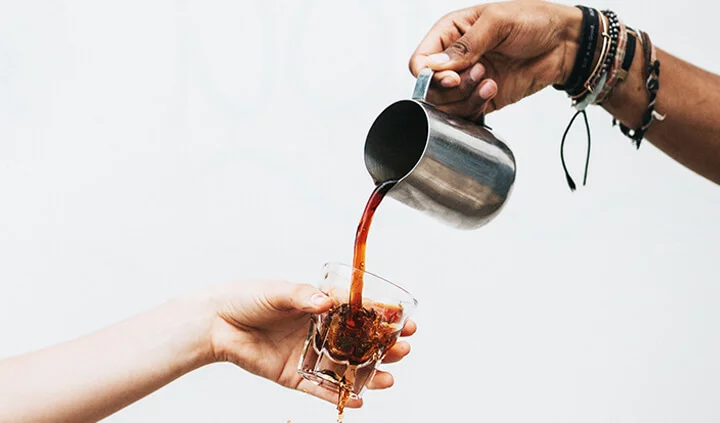
There is no doubt in the fact that taking caffeine helps a person to remain awake for a long time as it competes with the molecules that promote sleepiness. But consuming too much caffeine can be harmful to your body.
About 400 mg of caffeine in a day by an adult is considered to be safe by many health experts.
Although this figure does not go for kids, pregnant women, and lactating mothers. They should consult with their doctors about how much caffeine is sufficient for them.
What are the Elements that Influence the Caffeine Content?
Caffeine buildup in a cup of coffee is dependent upon the various factors that affect the amount of caffeine in a cup of coffee.
1. Type of Coffee Bean
Two types of coffee beans are available in the market.
- Arabica beans
- Robusta beans

Arabica beans are known for their sweet fruity taste and high acidity but are a little costly.
Adding to this they contain half the caffeine content of Robusta coffee. In comparison to this Robusta coffee beans tend to have a bitter taste and are comparatively lower in price.
2. Roasting
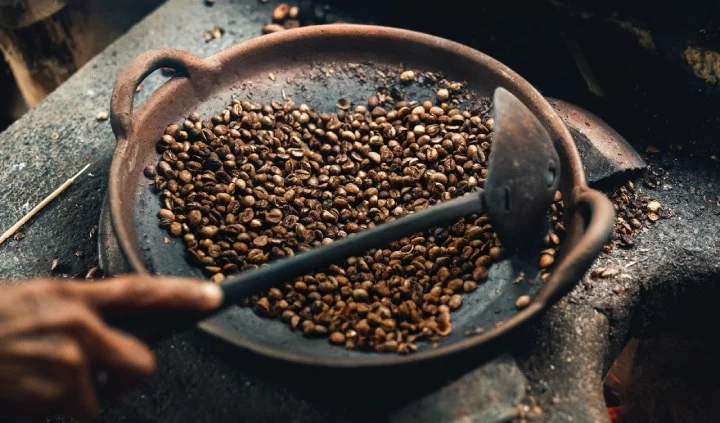
It is a myth among people that the darker the beans more will be the more caffeine content in them. But this is not exactly true because the roasting affects the mass of beans.
Whether you go for a darker roast or lighter roast, there would not be much difference in the caffeine content.
3. Brewing Method
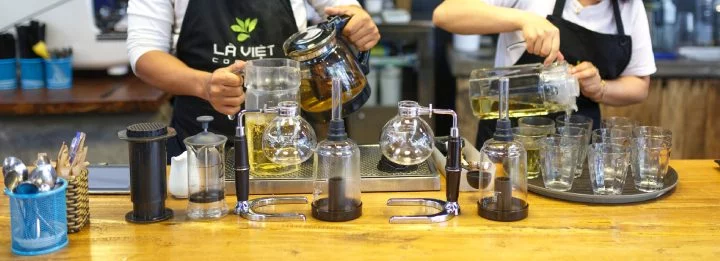
In the brewing process, the method you are using for brewing coffee plays an important role because the brewing method with a higher level of extraction will produce coffee with higher caffeine content.
The full immersion process extracts more caffeine from coffee compared to the pour-over method.
Longer the brewing time more will be caffeine extracted from the grinds.
It also depends on which equipment your using coffee makers or espresso machine.
4. Type of Coffee
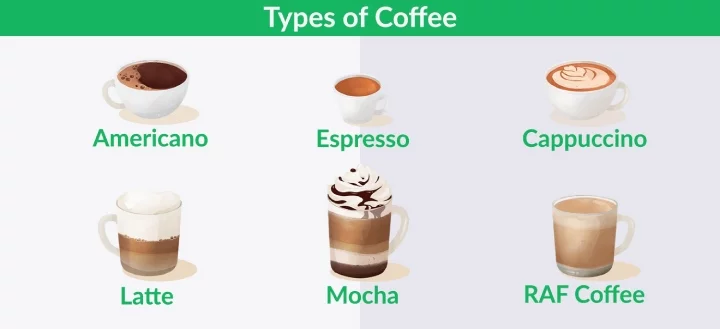
Different types of coffee have a different amount of caffeine content in their one cup it varies insignificantly from espresso to decaf coffee.
5. Grind Size

The grind size also determines the amount of caffeine content in the coffee as smaller grind size beans will have a larger surface area and will produce coffee with higher caffeine content and larger grind size will produce coffee with lower caffeine content.
6. Serving Size
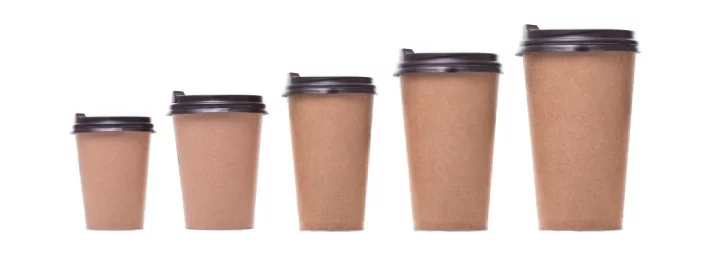
It depends upon which coffee you are having because different coffees come in different serving sizes and that contain a different level of caffeine content. In general, one cup of coffee can range from 1 to 24 oz caffeine and others are detailed below in the article.
How much Caffeine in Coffee?
Maximum people are dependent upon coffee for waking them up in the morning and getting them relieved from stress and improving concentration. But you should keep a check on the amount of caffeine in coffee, by doing so you will keep a proper health check.
On average you can expect to get around 95 mg of caffeine in your one cup of coffee. A caffeine calculator is also available online in which you can type the cups of coffee you have in a day and your weight and you will get to know the amount of caffeine you are having in a day.
Avoid giving caffeine to children or if you are doing so then give a very less amount because the amount of caffeine in one cup of coffee would be very harmful to children.
How much Caffeine in a Cup of Coffee?
Different types of coffee are served in different cups and are made in different styles that result in different levels of caffeine in them.
Some of the different types of coffees are given below that will give you an idea about the milligrams of caffeine in a cup of coffee. The measurements are done according to caffeine in 8 oz of coffee.
1. Caffeine in Brewed Coffee
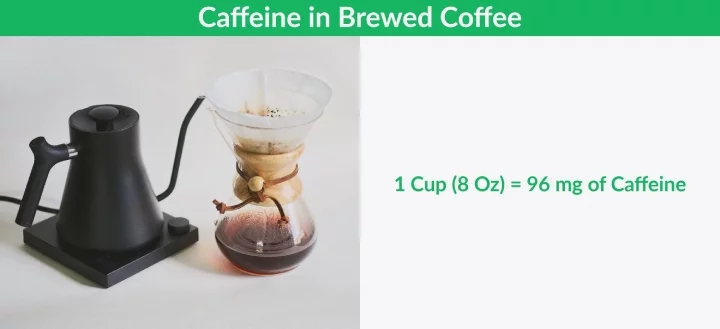
Brewed coffee is one the most common coffee drank all over the world and is also known as regular coffee that is made by pouring hot water over ground coffee using a filter.
That means that we are taking caffeine in brewed coffee the most compared to other coffee types.
1 cup of brewed coffee (8 oz.) = 96 mg of caffeine in coffee
2. Caffeine in Espresso

Espresso is made by forcing hot water or steam through fine coffee grounds and is made in a machine or a stovetop Moka pot.
Due to the high caffeine level in espresso, it is considered as strong coffee is generally served in small serving sizes compared to regular brewed coffee.
1 Oz shot of espresso = 63 mg of caffeine
3. Caffeine in Instant coffee

As the name suggests this coffee is known for instant preparedness as you can add hot water to the instant coffee grounds. This coffee is considered to contain less caffeine compared to regular brewed coffee.
1 cup of instant coffee (8 oz) = 59 mg of caffeine
4. Caffeine in Decaf Coffee
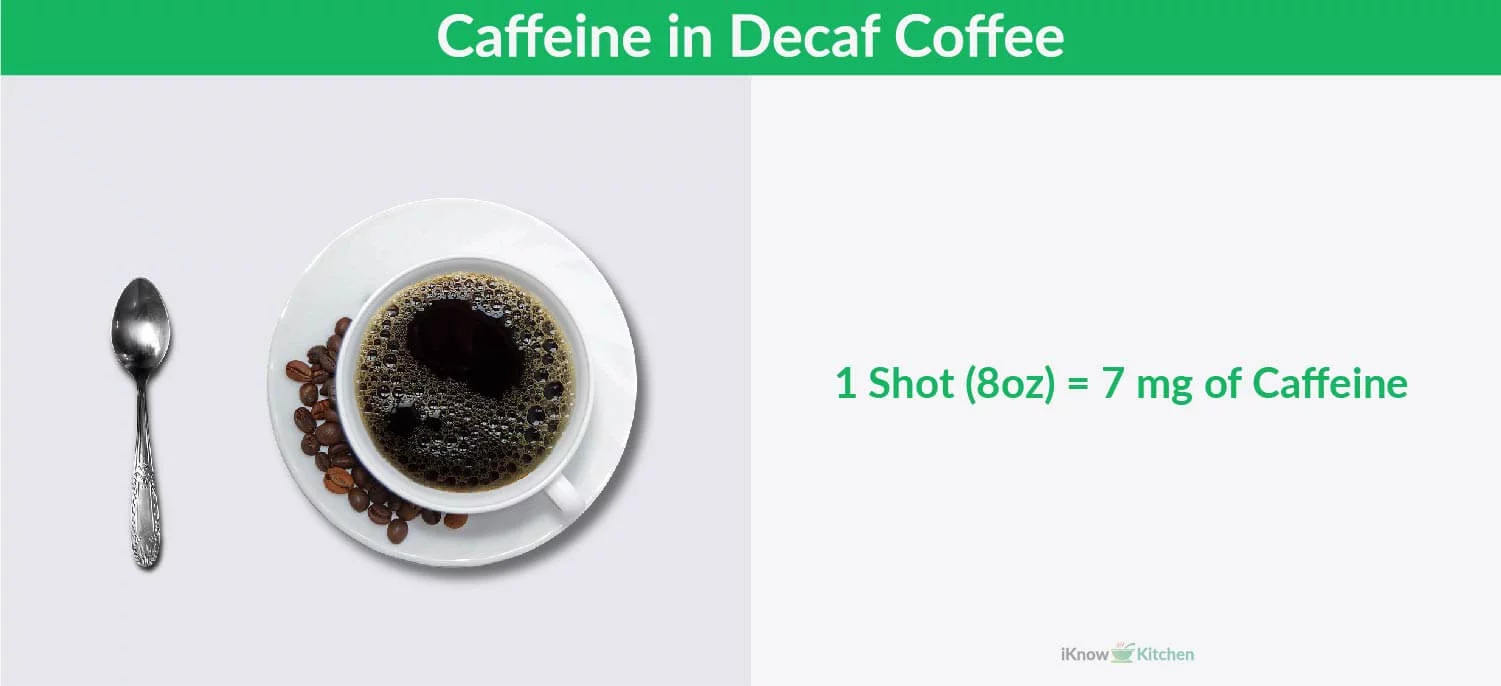
Decaf coffees are the ones in which 97% of the caffeine is removed by using some process.
But still, it contains 3% of the caffeine that can be taken by people who love to have coffee but are not allowed to have it. Still, there would be milligrams of caffeine in coffee.
1 cup of decaf (8 oz) = 7 mg of caffeine
5. Caffeine in Cold Brew Coffee

Cold brew is made with water at room temperature in which coffee grounds are steeped into.
It is different from iced coffee which is simply a coffee with lots of ice. Caffeine in the cold brew is somewhat a little higher compared to caffeine in regular coffee.
1 cup of cold brew (8 oz) = 96 to 152 mg of caffeine
6. Caffeine in Latte
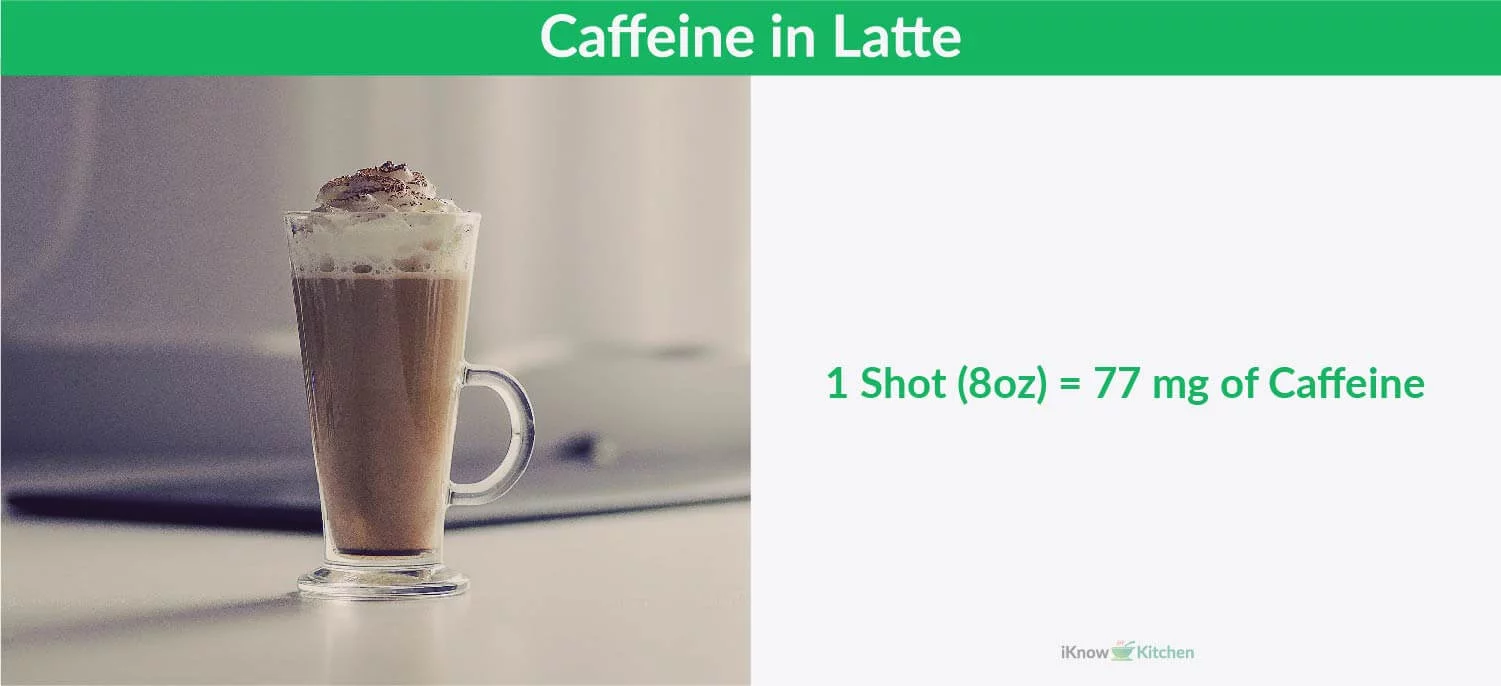
Latte is a specialized coffee drink that is simply steamed milk with one or multiple shots of espresso. It is a popular coffee drink around the world and it is also known for its creative servings.
1 cup of Latte (8 oz) = 77 mg of caffeine
How much Caffeine in Black Coffee?
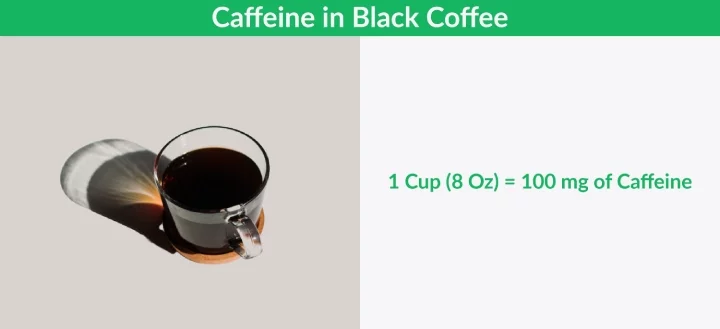
Black coffee is the one that does not contain any kind of milk product in it like raw milk, cream, or even froth milk, etc. It is generally consumed by people who have an acidic problem or are allergic to milk products.
It has a bitter taste and is flavored with additives and is low in calories, fats, and carbohydrates.
A single cup of black coffee (8oz) contains 0% fat, carbohydrates, cholesterol, sodium, carbohydrates, sugar, and 4% potassium.
Caffeine in black coffee (8oz)= 100 mg of caffeine
How much Caffeine in Regular Coffee?
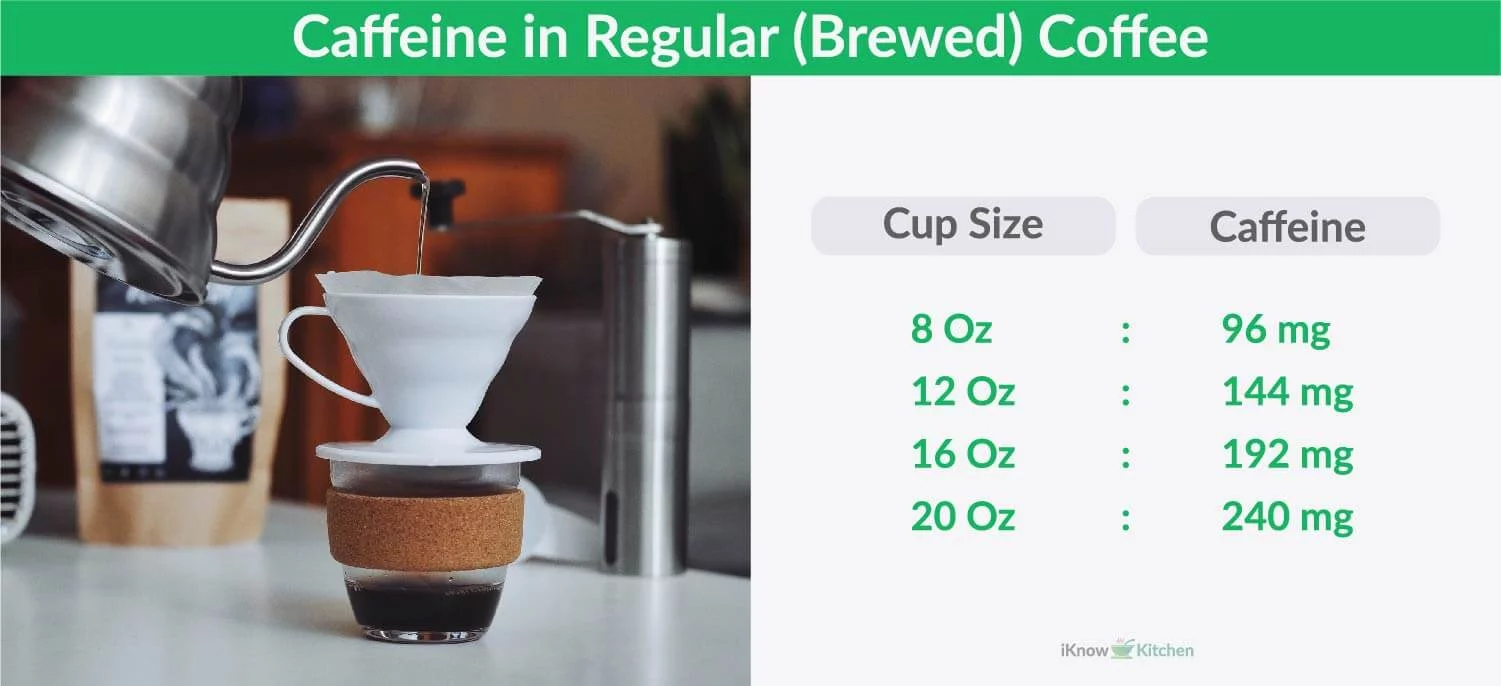
Regular coffee is also known as brewed coffee that is a common drink of coffee all around the world.
Coffee made with a lighter roast has more caffeine compared to darker roast beans because in the roasting process caffeine is lost due to high temperature.
The longer the roasting more the caffeine is lost and the darker roast tends to have a richer flavor.
The grams of caffeine in a cup of coffee according to the different cup sizes are as follows:
- 8 Oz of regular coffee = 96 mg of caffeine
- 12 Oz of regular coffee = 144 mg of caffeine
- 16 Oz of regular coffee = 192 mg of caffeine
- 20 Oz of regular coffee = 240 mg of caffeine
How much Caffeine in Coffee Beans?

Coffee beans available in the market and all around the world are of two types that is Arabica and Robusta.
Caffeine acts as a natural pesticide which helps in protecting the plants from various pest and pathogens.
The caffeine content in Arabica coffee beans is half the amount of caffeine found in Robusta coffee beans.
#1 Caffeine in Arabica Beans
Caffeine per bean= 1.9 mg
Caffeine per 100 grams= 1.2-1.5 grams
Caffeine per ounce= 340-430 mg
#2 Caffeine in Robusta Beans
Caffeine per bean= 2.9 mg
Caffeine per 100 grams= 2.2-2.7 grams
Caffeine per ounce= 630-770 mg
How much Caffeine in 8 Oz Coffee?
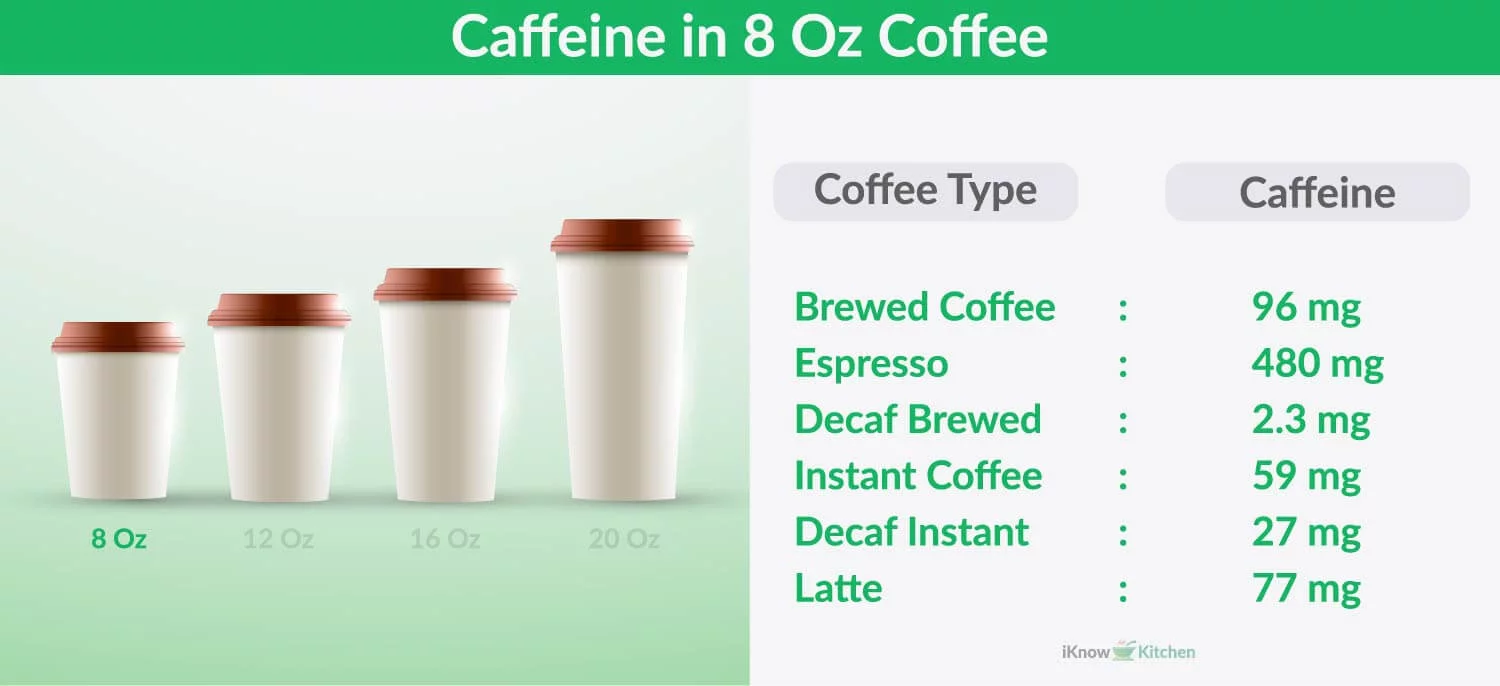
Average caffeine in a cup of coffee is dependent upon different variables that increase and decreases the amount of caffeine in a cup of coffee.
8 oz is a standard cup size of having coffee and is available at home and easily available at coffee houses.
Look at the table and get to know about the exact amount of caffeine you are having in your 8 oz (237 ml) cup of different types of coffee.
- Brewed coffee = 96 mg of caffeine
- Espresso = 480 mg of caffeine
- Decaffeinated Brewed = 2.3 mg of caffeine
- Instant Coffee = 59 mg of caffeine
- Decaffeinated instant = 27 mg of caffeine
- Latte = 77 mg of caffeine
How much Caffeine in 12 Oz of Coffee?

Some people prefer a little larger cup compared to 8 oz of coffee. Some types of coffees are served in 12 oz cups as it gives space to do some creative things with the presentation of coffee.
With the increase in capacity, the caffeine in an average cup of coffee also increases, which you will get from the information given below.
- Brewed coffee = 160 mg of caffeine
- Espresso = 721 mg of caffeine
- Decaffeinated brewed = 3.4 mg of caffeine
- Instant coffee = 88.5 mg of caffeine
- Decaffeinated Instant = 35 mg of caffeine
- Latte = 115 mg of caffeine
How much Caffeine in 16 Oz of Coffee?

16 oz of coffee is double the amount of 8 oz of coffee. Coffee lovers generally prefer to have their shot in 16 oz of coffee because it is quite sufficient for them to have it in this cup.
With the increase in size, the caffeine in 1 cup of coffee will increase and it is considered as a medium cup of coffee that is 145 mg per cup.
Caffeine level in 16 oz (454 g) of coffee in different types of coffee is given below
- Brewed coffee = 192 mg of caffeine
- Espresso = 961 mg of caffeine
- Decaffeinated brewed = 5 mg of caffeine
- Instant coffee = 118 mg of caffeine
- Decaffeinated Instant = 54 mg of caffeine
- Latte = 153 mg of caffeine
How much Caffeine in 20 Oz of Coffee?
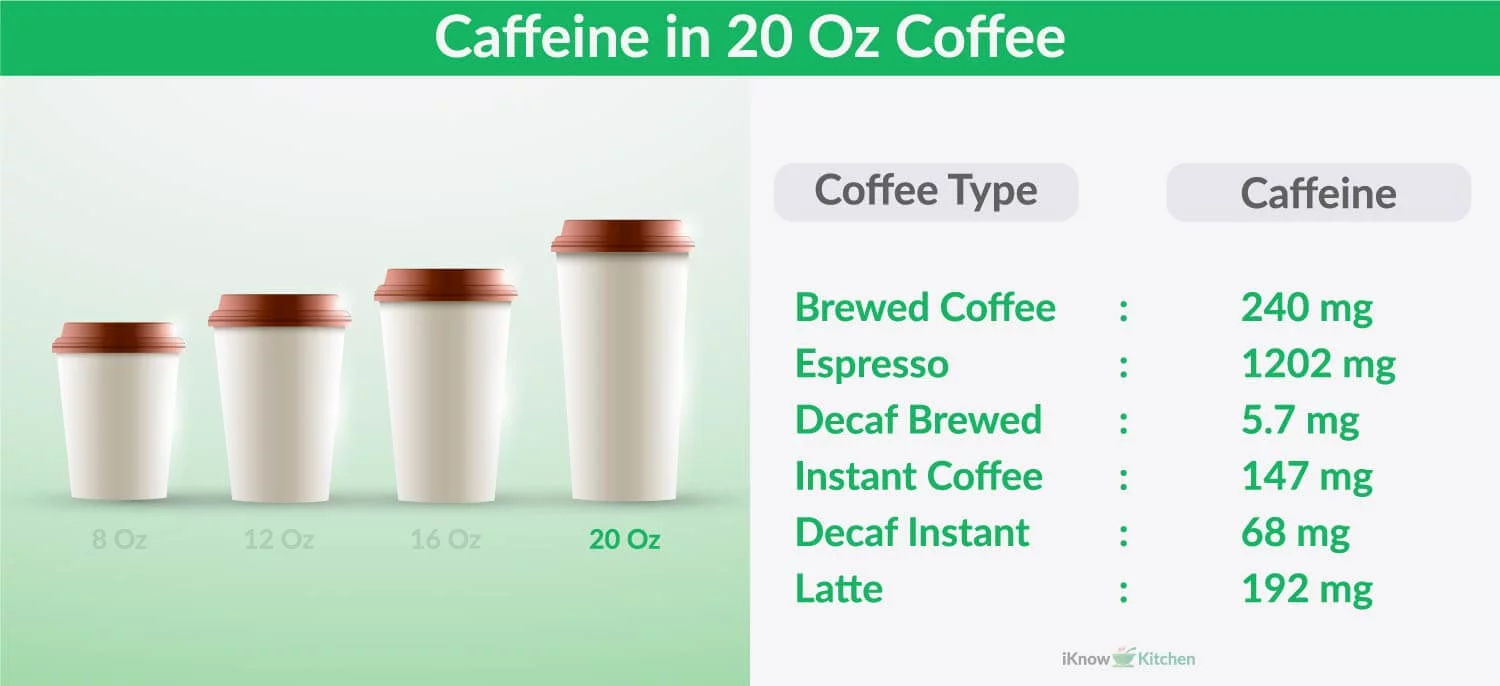
20 oz of coffee is the largest serving cup for coffee that is used to serve latte coffee which gives space for doing some creative work for the proper presentation of coffee.
With such a larger size the mg caffeine in a cup of coffee also increases and it is advised to consume 2 cups of such a large cup of coffee to keep the caffeine level in control.
Caffeine in 1 cup of coffee with this capacity is given below.
- Brewed coffee = 240 mg of caffeine
- Espresso = 1202 mg of caffeine
- Decaffeinated brewed = 5.7 mg of caffeine
- Instant coffee = 147 mg of caffeine
- Decaffeinated Instant = 68 mg of caffeine
- Latte = 192 mg of caffeine
Caffeine in commercial brand coffee
Starbucks
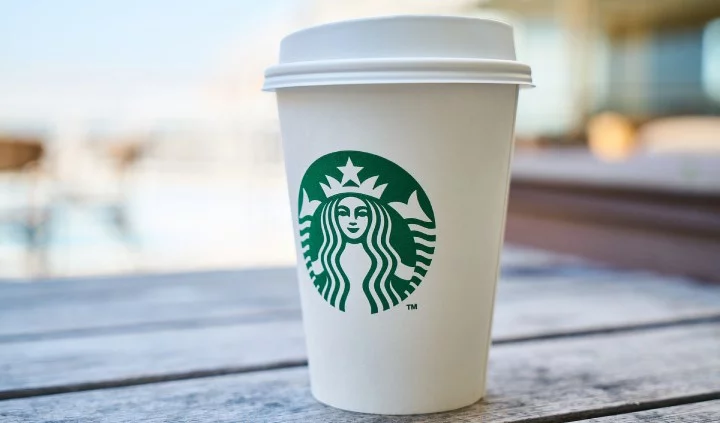
Starbucks is a brand that is so famous that you will find it in any corner of the world.
People who love Starbucks coffee do not have coffee from any other brand because their coffee not only tastes good but also has good nutrition value that helps in keeping you healthy.
Caffeine in an average cup of coffee available at Starbuck’s is as follows:
- A tall cup of pike place roast(12 oz)= 235 mg of caffeine
- A tall cup of decaf pike place roast(12 oz)= 20 mg of caffeine
- A tall cup of cold brew with cold foam(12 oz)= 155 mg of caffeine
- A tall cup of caramel macchiato(12 oz)=75 mg of caffeine
- A tall cup of cappuccino(12 oz)= 75 mg of caffeine
McDonald’s

McDonald’s is one such brand about which even a child knows because of great flavors and other things are available there.
Generally, they sell their coffee under the name McCafe brand. Note down the mg of caffeine in a cup of coffee given below.
- Small(12 oz)= 109 mg of caffeine
- Medium(16 oz)= 145 mg of caffeine
- Large(21-24 oz)=180 mg of caffeine
- One shot of espresso= 71 mg of caffeine
- Decaf coffee(8 oz)=8-14 mg of caffeine
Dunkin Donuts

Dunking donuts is a well-known brand when it comes to serving the best coffee in the town.
At present, there are many franchisees of dunking donuts all around the world. They serve almost all types of coffee and caffeine content in a cup of coffee of each type differs from one type to another.
- A medium cup of brewed coffee (14 oz) = 210 mg of caffeine
- A medium cup of Cold brew (14 oz)= 260 mg of caffeine
- A medium cup of decaf brewed coffee (14 oz)= 10 mg
- Medium cup of Americano(14 oz)= 249 mg
- Medium cup of Latte(14 oz)= 119 mg
- A single shot of espresso= 85 mg
Seattle’s Best

Seattle’s Best coffee is known for its best taste and it is available at the company’s retail store and drive thus, you can also find this coffee at fast-food restaurants and food corners.
Here is the table to show you how much average caffeine in a cup of coffee does each type of coffee at Seattle’s best.
- A small cup of brewed coffee(12 oz)= 260 mg of caffeine
- A small cup of latter(12 oz)= 75 mg of caffeine
- A small cup of mocha(12 oz)= 80 mg of caffeine
- One shot of espresso: 75 mg
What are the benefits of adding caffeine to your drink?
Caffeine is not completely harmful to health if taken in an average amount in your drink then it gives you various benefits for your health and is confirmed by various researchers. Some of the benefits are listed below:
1. Weight loss

Caffeine in your drink boosts weight loss by suppressing the appetite and reducing the desire to eat temporarily. It also stimulates thermogenesis through which the body generates more heat and energy from digesting food.
2. Alertness

The most common benefit given by a coffee lover is that it keeps the mind alert and helps in focusing.
75 mg of Caffeine content in a cup of coffee can increase your alertness and attention and 160 to 600 average mg of caffeine in a cup of coffee can improve your mental alertness and memory, but never use caffeine as the substitute for sleep.
3. Liver and colon
Through research, it has been proved that consuming coffee in an average amount helps in improving the functioning of the liver and colon.
It reduces the risk of cirrhosis and also slows the rate of disease progression in hepatitis C infection.
4. Skin problems
Generally, skin problems are caused by exposure to UV rays and it is suggested by various researchers that a sufficient amount of caffeine in a cup of coffee guards your skin against a certain type of skin cancers.
5. Cardiovascular disease
A certain amount of mg of caffeine in a cup of coffee decreases the chances of getting stroke up to 22 percent compared to people who do not drink coffee on daily basis.
It can be said that no coffee can be linked to an increased risk of stroke.
6. Depression
As caffeine is known for boosting mental strength so taking some milligrams of caffeine in a cup of coffee can be very beneficial in fighting depression and anxiety. But taking a higher dose of caffeine can reverse the effect.
What are the effects of having too much caffeine?

Consuming 4 to 6 average cups of coffee in a day contains normal caffeine mg in coffee but consuming more than that can be harmful to your body. Some of the effects of having more than the average amount of caffeine in a cup of coffee are:
- Headaches
- Nausea
- Sleeplessness
- Vomiting
- Anxious feeling
- Dehydration
- Tremors
- Upset stomach
Recap
The average mg of caffeine in a cup to be consumed daily is 400 mg and for children and pregnant ladies, it is not allowed if you still like to have it then consult your doctor first.
Average caffeine in coffee varies from the variety of beans, style of brewing, and the type of coffee you are consuming. It all depends upon the factors that increase and decreases the mg of caffeine in a cup of coffee.
A standard 8 oz cup of coffee has 80-100 mg of caffeine and it depends significantly upon the way you make it.
Enjoy coffee with an ample amount of caffeine that is beneficial for your health.





